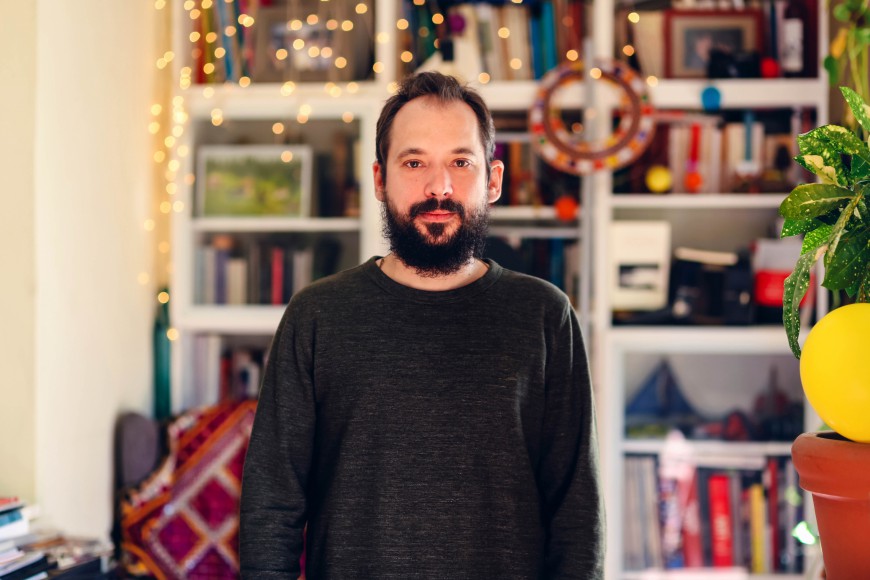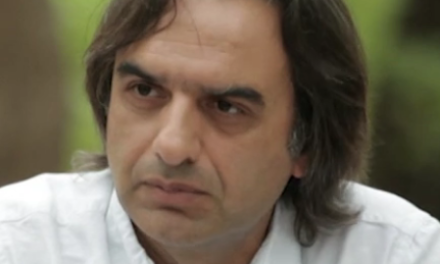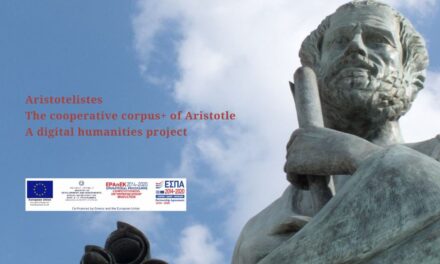Alekos Lountzis (b. 1978) studied law, communication, and social anthropology in Athens and Cambridge. He works at the P. Sakellaropoulos – Institute of Mental Health for Children and Adults. His poetry collection The Next Us was published in May 2021 by Stigmos. He has also published Propaganda (2015, Gavriilides), which was awarded the Anagnostis Prize for Debut Poetry Collection, and the opera libretto Visions and Wonders of General Makriyannis (2019, Kichli) composed by Dimitris Maragopoulos, which was staged at the Greek National Opera (Alternative stage) in April 2019. He has done the dramaturgy and libretto—in English, in cooperation with Orfeas Apergis—for the contemporary opera The Fall of the House of Commons composed by Orestis Papaioannou, which will be presented in Germany in 2022.
Your second poetry collection, The Next Us, was recently published by Stigmos. Tell us a few things about it.
My own starting point always refers to a dense past that has to do with architecture, successive testing or undermining the material, and finally the construction of the idea, which in turn defines the form and style of each book. Just as Propaganda (2015) was based on a psychological observation—whoever claims the word, on whatever condition or confrontation, wants to be believed—so my latest book employs a modular structural theme. Here, somewhat codified, one can discern the intensities of selective affinity and imposed tradition, the angst of self-determination, as well as a common fantasy — the passing of the torch to those who will come after. The title also serves as a kind of chart for the whole book, which is divided into three sections: there are poems for “Us”, poems for the “Next,” and still others for the article “The” — whatever one chooses or is impelled to recognize as a major reference.
The “The” section includes poems referring to imaginary, real, regardless of their fictionalisation ancestors, with an awareness of the hazard within each attempt to recap. In the “Next” section, there are poems of projection, with raw materials drawn from immediate reality and “stretching” to possible futures. Verses that may point to the direction of a time structure that seeks the logically impossible, to narrate the future, as Miltos Pechlivanos eloquently put it, referring to examples of modern Greek prose (“Thoughts on the future perfect tense of a literature on the move”, Thessaloniki, 2018).The last section comprises poems of identification (but not identity), given that nobody and neither époque carry only one, no matter how intensely they invest in its construction or makeup. I confess that this “we” troubled me the most; in order to support the final verses, the material had to be preceded by intensive reduction, to erase all second thoughts of public or private relations in the writing. It culminated in a close scrutiny of floating concepts such as here and there.
This may be the reason that «Vanishing point» remains the sole uncategorized poem and the sole mythical object of the collection.
Οι επόμενοι The ones to come
αναμενόμενοι as expected as
όσο εμείς ourselves
Ό,τι ακολουθεί διαμείφθηκε εν τω μεταξύ What follows was traded in the meantime
In her review of the book, Varvara Roussou commented on the ways that your poetry stands with disbelief and even irony vis-à-vis the over-optimistic certainty of our solidly constructed ancestors, the ‘we are from a good generation’. How do you grapple with the burden of history and your poetic predecessors?
Searching for relations and references was a foundational decision for at least one part of the composition (“The”). The two-dimensional intertextuality, which sometimes connects and sometimes blows up bridges, is in a way the map one chooses or is forced to choose in order to start the journey and reach a destination, any destination, so as to antagonize, reassure himself or just navigate around words and objects.
An unprecedented potential for self-direction —constantly creating digital copies of oneself— was opened in our —not so brave— new world. Millions of private comments are reproduced in public —during a day, night or instant tagging shift— all claiming to be unique records; you know where and you know how. I have long observed this phenomenon of personal propaganda: the systematic overestimation or elimination of our differences, depending on what one wants to prove or avoid. I am interested in its timelessness and the abundance of materials that are drawn from the next door, from the blank future or the claimed past. In this book the main focus was on that “among us”; on the tendency to sweep across personal accounts and reify categories just after we create them.
My intention in The Next Us was to write interwar poems without symbols, within a History without center, with an awareness of the contradictions that undermine any potential for universality. However, there is no dimension of exteriority in our surroundings. Whether we like it or not, the capital letter “H”, the one that crystallizes and classifies, with every flutter of its wings, returns at all times and embraces the text or its prey.
In her critical text, Varvara Roussou pointed out an even subtler and more important thread, whose detection is one of the few pure satisfactions of our work. Her elaborate presentation connects the electrical wires between the emerging distrust against the self-correction of the future —a crucial motivo of the collection— to the collective and somewhat wry need for “‘recapitulation’” that reached all the way to the back cover.
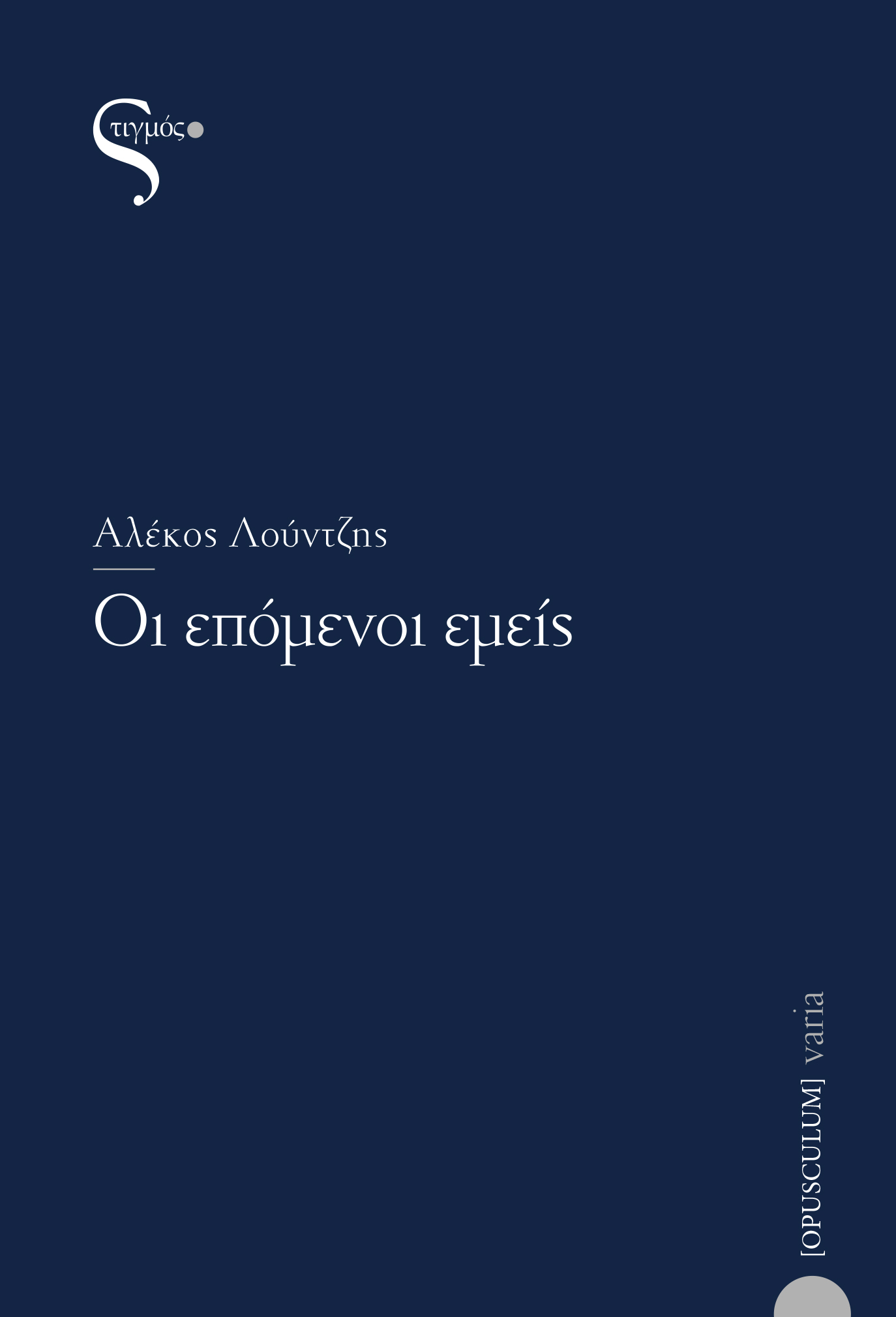
In an interview to Reading Greece, Michaela Prinzinger argued that “what actually continues to restrict Greek literature, despite efforts to become known in Europe and the world, is the legacy of the ‘Zorbas syndrome’; that folkloristic image continues to exert influence”. Could poetry be used to debunk stereotypes and help form an alternative national image? How do contemporary young poets relate to world literature?
I will consciously refrain from focusing on folklore in national terms, and on its potentially negative impact on contemporary Greek literature, not because it does not exist, but because I do not consider it to be the decisive factor pertaining to how it is read, approached, and evaluated. Small countries and/or colonies (of any period) risk falling prey to exoticism — the fantasy of exceptionalism or of an immaculate source. Fiction and poetry are not without blame for reproducing it, but they can also help to reverse the trend. However, at the current juncture, I do not think that they are either at the vanguard of social transformation, or that this danger is as corrosive as it was, for instance, in the previous century. Instead, I would counter that there have been some recent and more evident shifts in the field, such as the emerging self-referentiality and self-fiction, which also shape audiences and rules in a subtler yet equally effective ways.
One could argue that this is the effect of the mass popularization of psychoanalytic discourse as a kind of necessity. One could also look for the causes in the saturation of the entertainment industry, which combs reality in search for novel raw materials. When identities, privacy, and experiential narratives about our past, present, and possible future are placed next to tangible products with an expiration date, then time expands and subscription fees escalate. With a single move all stories become personal and touching, while at the same time their primary value and potential processing are directly measurable by the algorithms of the market. And if the interaction of literature with the entertainment industry, especially the moving image, is fluid by definition, I reckon that in this juncture, where novels become screenplays and film franchises —or, in the case of the poetic universe, compositions are “enriched” by a multimedia spectacle and verses become part of a performance— the correlation becomes even clearer.
Just to be clear, I raise no issue of danger or threat. All of the above could be listed as an answer to the conventional alterations of perception. Capital letters in titles —e.g. Literature, History, the Center, the Periphery— continue their separate journeys without tolls, or rather with those tolls that have always regulated their movement. What seems interesting to me in this respect are the opposite or contradictory features of this particular turn or return in contemporary literary production. On one hand, important original works are being produced today and new analyses are compiled with genuine care to acknowledge those voices which have been methodically excluded or marginalized. On the other, they seem, at least temporarily, to go hand in hand with others which force the commercialization of experience as advertising material, and in my opinion contribute to a new ethic of intensive introspection, beautification, and performative political correctness (as a postmodern variant of ERT2’s game show of the 1980s titled “Say it and it will be done”). We, the same users who exhaustively comment on reality in daily posts, are gradually drawn in all fields to that most available material, the mythical self. When all stories are transparent and kaleidoscopically reproduced, there is something innocent and at the same time voyeuristic in their consumption within the vast private laboratory.
The flourishing of confessional fiction is, I think, not merely a trend within literature and cannot be effectively delimited by traditional means and borders; it seems to be first and foremost a critical variable in contemporary societies or even an addiction — absorbing teasers and metabolising recaps. It is structurally related, in my opinion, to intensive and long-term self-exposure to social media, both on the part of the writer and the reader. As the fear of annihilation —or the anxiety of disappearing into a digital forest of pseudonyms— increase, the tendency to keep constantly introducing yourself is probably anticipated. At times it can be liberating and result in great prose or significant poetry. Above all, it means nothing a priori for the literature produced, which is judged book by book and paragraph by paragraph in every version and at every period. Yet, it may also mean that the explosive material of our literature—at times a masterpiece and at others inevitably its folklore—is more a matter of globalization than of locality or national stereotypes. It is not reserved as our exclusive “privilege” or certificate as the closest relatives of Zorbas (there is a question whether it is the “relative” or the registrar who insists on consolidating this kind of representation), but as an essential part of the modern condition which literature is called either to obey or to confront. If the latter is the case, the already limited resonance of poetry and some of its primary features —concision versus exuberance, focused critique versus description, rhythm and meter versus a flood of images— may allow for a trajectory shot or at least leave an open crack.
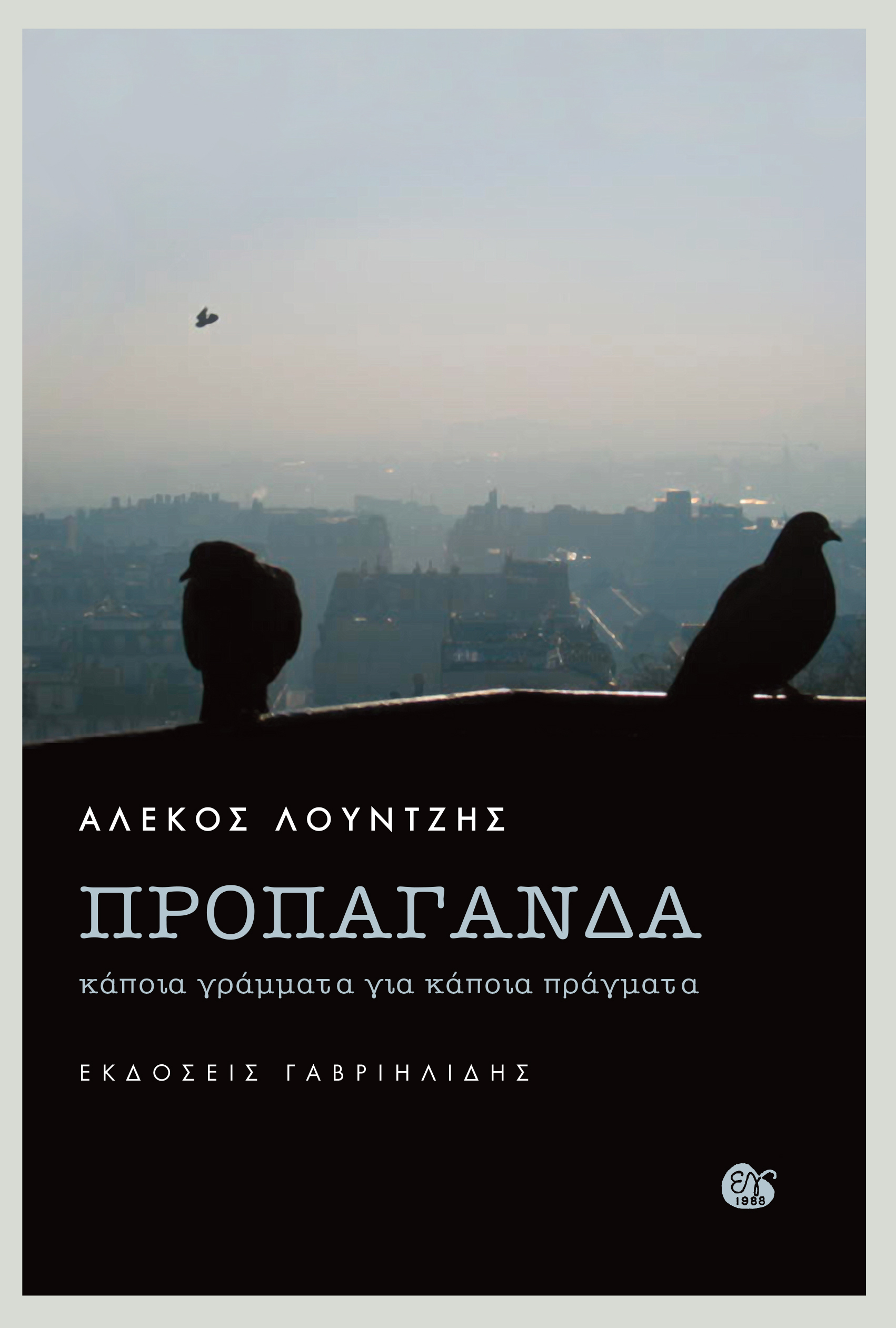
Which are the main themes your poetry touches upon? In this respect, what role does language play in your writings?
Simple though it may sound, I would say that we always try to write the literature we would like to read. How can it be any different? In my case, a poetry of extroversion and hopefully of penetration —politically or socially oriented, as you like, yet always leaning out the window facing the street— rhythmic, perhaps with an insistence on economy of speech and lyricism. My personal confrontation both in this and my previous works is precisely this pursuit of density within the meter. To lay down most of what you imagined with the fewest means you can afford, an attempt not exactly at reduction but something like a diet, to dehydrate the tongue without giving away the bread of the idea.
The momentum was already there, while the technique is constantly evolving, disclosing missed opportunities, especially when you return to what has been written, as well as paths that, as long as you follow them, they will reward you. My relationship with music, primarily as an ardent listener, and the opportunity to write a libretto for the opera was a defining moment both for my writing and its subsequent editing — mainly because it is composed of indefinite hours of study, doubt, trial and error; until everything is brought to a full stop, in a way that makes sense both on paper and as echo. I owe this first and foremost to composer Dimitris Maragopoulos for his encouragement and, most of all, for our valuable collaboration in the opera Visions and wonders of General Makriyannis, which was staged at the Greek National Opera (Alternative stage) in April 2019.
For the past two and a half years, we have been working on the same track but towards new directions, with composer Orestis Papaioannou, to create a contemporary chamber opera titled The Fall of the House of Commons (the English version of the libretto in cooperation with poet and translator Orfeas Apergis). The suffocating environment of Poe’s short story, taken as a distant starting point, is politicized and transferred from the emblematic tower into the most common heart of a modern divided metropolis, in a standard apartment where a “broken couple” and an anthropomorphic machine of artificial intelligence co-exist. It’s an attempt to create a sci-fi opera based on material from an ever-closer reality— the emergence of human-like machines and machine-like citizens.
What about the relation of poetry to the world it inhabits? Would it be plausible to talk about poetry as an autonomous act or rather as a socially interrelated/mandated art? How does the national/local interweave with the global?
In the landscapes of western cities, with all their homogeneity, the question is absolutely crucial; in other coordinates, an analytical customization, unfeasible within the present framework, would certainly be necessary. The majority of young poets, at least those of us who publish our work in Berlin, Bucharest, and Athens, despite our possible differences, grow closer and closer together: a university degree, a fast internet connection, participation in some of theartists’ “exchange” communities. We use the same themes, the same ultimately recognizable technical variations, in what spare time our daily work leaves us, while our readers are scarce compared to the population of our countries. It’s certainly not something new and it rarely produces illusions. There is no material impact, there is no influence outside the walls of our trade; everything that is written comes out of the purest form of ambition, which at times is called necessity. The national/local and global dimension at present has become quite fluid. Sometimes, it appears almost irrelevant to people living on opposite sides of the map, while it generates reverse temperatures for others living in the same city. It is impressive how many contradictions fit in three blocks of the same neighborhood if one focuses on concepts and conditions that seem antipoetic, such as class, access to work and public health, the potential for real life choices.
Small communities have something ambiguously heroic and at the same time something outright funny. All of us who write literature in 2021, namely we —the living poets society in the Facebook and Netflix era— are moving into something that looks like a millennial gathering. We strive to publish our books and we long for reviews, we enter disputes and form alliances, we build genealogies and organize succession, as if someone out there is anxiously waiting for it, as if someone genuinely cares. Self-sarcasm helps one to preserve their mental health and testifies to certain qualities: a keen awareness of the ebb and flow of the field, a modicum of humor and another of kindness — since the barrel of the gun first and foremost points at the one holding it.
There is, however, something that I believe is important and precedes the possible literary evaluation of the centuries to come. It is primarily the arduous work with the common words, no matter how successful, and the persistence to withstand the prevailing conditions — a strenuous effort to widen the narrow present in order to sustain our purpose. It is the non trivial fact that either with a readership of a million readers or only ten —probably divided in two factions publishing two journals perpetually at war— we would basically do the same solitary work. If you think about it, it is not the sole domain where the futility of the ambitious pursuit distinguishes the venture. And yet, although we are fully aware that no book can change one’s life completely —usually not even that of its writer— we continue to write in order to add still more variables to the equation. Because if one stands out, we may indeed change something…
Finally, although I usually don’t like to quote from my own work, I will do it here with minimal regret, given that if I had to, I would write again The Next Us just to put in the following verses from the poem “Field of struggle”:
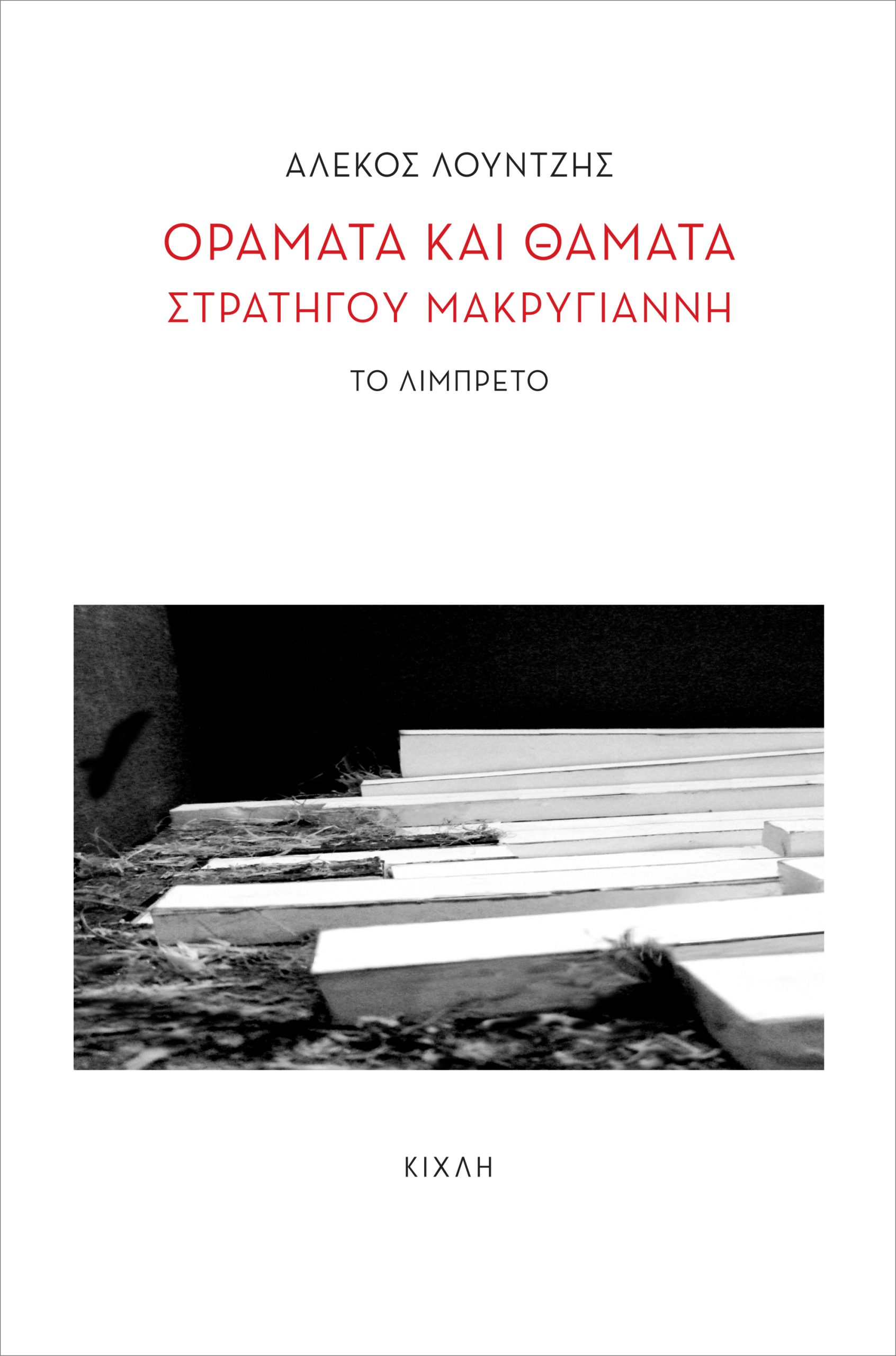
At your short paper published in the project “Revolt” by Vassilis Lambropoulos (C.P. Cavafy Modern Greek Chair in the Department of Classical Studies and Comparative Literature) of the University of Michigan)you wrote “The revolt that is simmering looks like a drilling in a world that no longer betrays expectations but its very foundations”. Tell us more.
Our “open” and virtually interconnected societies look more and more like copies of the same isolated medieval castle that is declining and besieged. They survive within their quotes! The more crystallized the certainty that it will fall, the more the unwavering belief of luxurious living in decay spreads. It might seem noteworthy that the average consumer, this last persistent attribute of the Western citizen, is so eager to upgrade their mobile phones and sneakers, while they use the last drops of water available; following the pop advertising ethics off a cliff. Or maybe not so worthy…
The late bell wasn’t heard even when it sounded like a siren on the empty streets of the pandemic or during an “extreme weather phenomenon”, which nowadays occurs three times a month across the globe. The magic of private initiative transformed us into stray mammals which see and remember nothing except the password of their online accounts. Yet, there are two parallel lines visible from every part of the map, like train tracks interrupted in the desert; the one feeds on the greed of the privileged tenants in the present and their blissful indifference to what is to come. The other, as Zygmunt Bauman wrote as early as the first decade of the 21st century in Liquid Times: Living in an Age of Uncertainty (Cambridge: Polity Press, 2007), perpetuates the systematic production of ‘human waste’ or wasted lives –‘superfluous’ populations of migrants, refugees, other outcasts– doomed to roam until an isolated “landfill” is found; far enough to avoid shaking the confidence of the public in the funeral home — that is the existing system of governance.
What happens when a material for eternity reaches its melting point? Hegemony may call for funding programs to foster innovation in collective mourning, or societies may be called upon to reconsider some form of central planning. Because it now seems very likely that if they don’t do so, there will be nothing self-referential left to narrate. Τhis hypothesis has been already widely discussed between ourselves and our doppelgangers. The final offer could come either from the heavenly depths of an offshore company or from the rough waters of a massive demonstration. At some point, however, the next us will be forced to take on that endeavour using their proper names.
*Interview by Athina Rossoglou
TAGS: LITERATURE & BOOKS | READING GREECE

